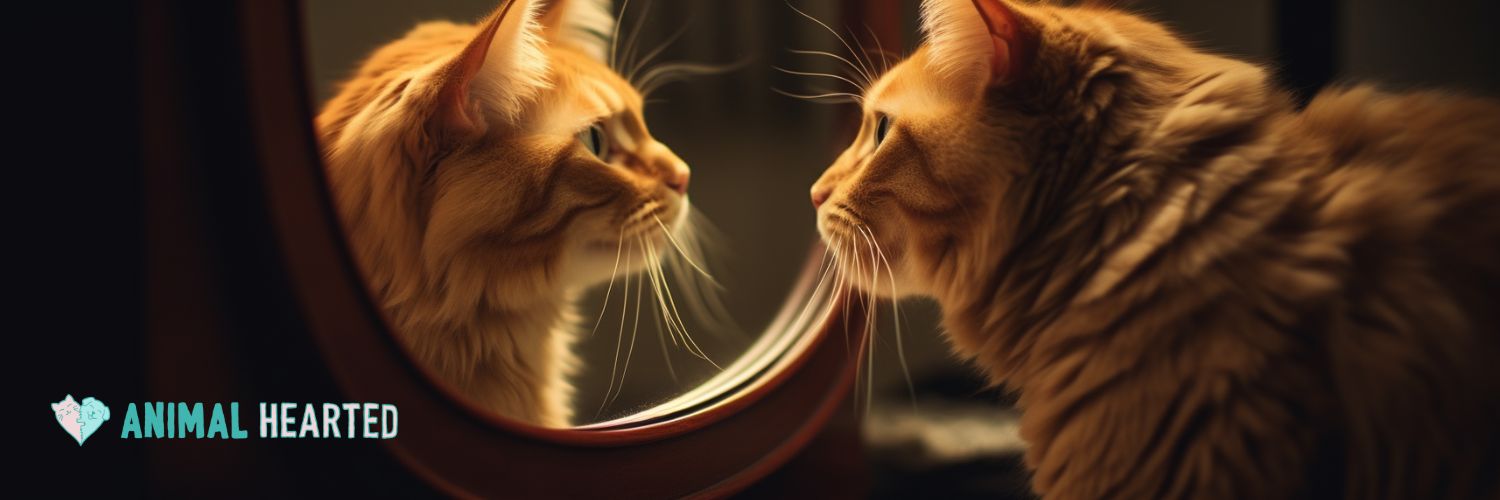shelter pets in need
Each order helps pets in need

You've probably already seen funny cat videos where they dance with their reflection, but have you ever wondered if they truly recognize themselves?
Dive into the heart of feline psychology as we explore the mirror test, a benchmark for self-awareness in animals.
We'll dissect behavioral studies and ponder the implications of cats' potential self-recognition.
Uncover the mystery: Are cats aware of their own existence, or are they simply reacting to a familiar yet puzzling presence?

You'll find self-recognition, the ability to identify oneself in a reflection, to be a complex cognitive skill that's rare in the animal kingdom. This process taps into advanced cognitive abilities, suggesting a level of conscious awareness that goes beyond simple sensory-motor responses.
In recognition research, scientists conduct interspecies comparisons to determine which animals can perceive their own identity in a mirror.
The concept of identity perception is nuanced and extends beyond mere visual processing. It requires an understanding that the reflection isn't another entity but a representation of oneself. This self-awareness indicates a higher level of cognitive functioning. For many species, this remains an elusive trait.

When you watch different animals confront their reflection during the mirror test, it's clear that not all possess the cognitive ability to recognize themselves. Mirror experiments have been pivotal in studying animal consciousness, providing insights into cognitive benchmarks that distinguish species.
These tests involve marking an animal in a way that can only be seen in a mirror, then observing whether the animal shows signs of self-directed behavior, indicating self-recognition.
Interspecies comparisons reveal a spectrum of reactions to mirrors, ranging from indifference to aggressive displays. Only a handful of animals, including certain primates, dolphins, and elephants, have consistently demonstrated this ability, hinting at the complex cognitive landscapes within these creatures.
They inspect the mark on their bodies using the mirror, meeting recognition thresholds that imply a form of self-recognition.
However, the interpretation of these results isn't without controversy. Critics argue that the mirror test may not be an adequate measure of self-awareness for all species, as it relies on visual cues, which may not be the primary sense for some animals.
Consequently, while the mirror test has provided valuable data, it's important to remember that it may have not been able to capture the complexities of animal consciousness.
READ NEXT: Cat Purr Healing Power: Benefits For You And Your Pet

In contrast to the self-aware behavior exhibited by species like apes and dolphins, you might notice that cats typically exhibit a range of reactions when faced with their reflection, from curious investigation to complete disinterest. These responses can be broken down into several key behavioral patterns:

Cats' reactions to mirrors, while not indicative of self-recognition, have prompted researchers to conduct various behavioral studies to delve deeper into the feline psyche.
These studies often assess cat curiosity, observing how a cat explores and reacts to its reflection as something novel in its environment. Initially, cats may exhibit playful pouncing or cautious approaches, which can be misconstrued as recognizing another cat rather than themselves.
Territorial behavior is another aspect scrutinized in these studies. Cats might display aggression or marking behaviors when they perceive something as an intruder. The same can be said when asked why cats attack Christmas trees.
However, the lack of scent accompanying the visual cue often leads to a quick dissipation of this aggressive stance, indicating a complex sensory processing at play.
Furthermore, investigations into social interactions have revealed that cats don't use mirrors as tools for social communication, as seen in some primate species. This is consistent with the solitary nature of many feline behaviors.
Overall, the analysis of cat behavior in front of mirrors contributes to a better understanding of their cognitive abilities, sensory perceptions, and social cognition, even if it doesn't confirm self-recognition.

You'll find that the implications of feline self-awareness extend beyond simple mirror tests, influencing how we interpret their behavior and intelligence. Recognizing oneself in a mirror suggests a level of cognitive sophistication that resonates through various aspects of a cat's life.
Here are three critical areas where self-awareness might manifest:
Understanding feline self-awareness isn't only about whether they recognize themselves in a mirror; it's about unraveling the intricacies of their minds and respecting their intelligent, sentient nature.
Curious about other cat behaviors? Learn about why cats head bump you next!
You're diving into how pets like dogs or birds stack up against cats in mirror curiosity through self-awareness experiments and behavior observation, analyzing species comparisons within the realm of animal cognition.
You might find that a cat's inability to perceive itself in a mirror doesn't notably affect its emotional health, showing no clear stress signs or mirror anxiety as a behavioral reflection of self-perception impacts.
You'll find no evidence that breed intelligence, genetic factors, or sensory perception influence a cat's mirror recognition. Current neurological research doesn't distinguish breeds regarding self-recognition abilities in mirror experiments.
Mirror exposure timing matters. You'll find that early life reflections contribute to developmental recognition stages. Habituation effects influence age-related self-awareness, shaping whether your pet will see its reflection as their own or as an intruder.
You can enhance training strategies by employing positive reinforcement, integrating mirror games, and closely observing your cat's behavior to provide environmental enrichment that fosters a deeper bond and more effective learning experiences.
While cats may not pass the traditional mirror test, they exhibit complex behaviors suggesting a form of self-awareness. Studies show only 10% of cats show aggressive behavior towards their reflection, hinting at a nuanced understanding of self versus other.
This challenges the notion of self-recognition as a binary concept and invites you to consider a spectrum of self-awareness in animals, with cats occupying a fascinating position within it.
Next, discover how you can keep the peace with these multi cat household tips!
Leave a comment